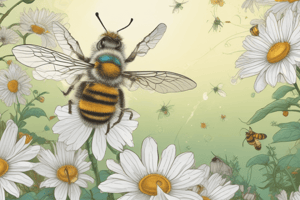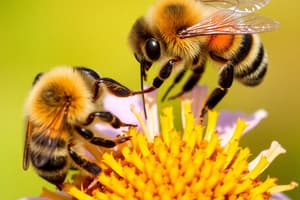Podcast
Questions and Answers
What percentage of the world's food crops are bees responsible for pollinating?
What percentage of the world's food crops are bees responsible for pollinating?
Bees are responsible for pollinating over a third (approximately 35%) of the world's food crops.
How would the extinction of bees affect the global food supply?
How would the extinction of bees affect the global food supply?
The extinction of bees could have disastrous effects on the global food supply, with supermarket shelves holding only about half the fruits and vegetables they currently have.
What is the estimated economic value of the work that bees do for US farmers each year?
What is the estimated economic value of the work that bees do for US farmers each year?
The work that bees do for US farmers is worth approximately $15 billion a year.
What are some reasons that bees have been dying off at record rates for the past decade?
What are some reasons that bees have been dying off at record rates for the past decade?
How could the extinction of bees affect other animals?
How could the extinction of bees affect other animals?
What are some ways that researchers are developing new pollination methods?
What are some ways that researchers are developing new pollination methods?
What are some ways that individuals can help protect bees?
What are some ways that individuals can help protect bees?
Flashcards are hidden until you start studying
Study Notes
- Bees are critical pollinators responsible for over a third of the world's food crops.
- Bees are dying off at record rates, which could have disastrous effects on the global food supply.
- Without bees, supermarket shelves would hold about half the fruits and vegetables they currently have.
- The extinction of bees could have a domino effect on animals that eat those plants.
- Humanity wouldn't necessarily face global famine, but our diets would suffer in major ways.
- The work that bees do for US farmers is worth about $15 billion a year.
- Bees have been dying off at record rates for the past decade due to global warming, overuse of pesticides, and parasitic varroa mites.
- Researchers are developing new pollination methods using robots and drones.
- Planting a range of flowers, leaving bare ground, providing access to water, and reducing pesticide input can help protect bees.
- There's still a lot to be done to protect Earth's most buzzy pollinators.
Studying That Suits You
Use AI to generate personalized quizzes and flashcards to suit your learning preferences.




